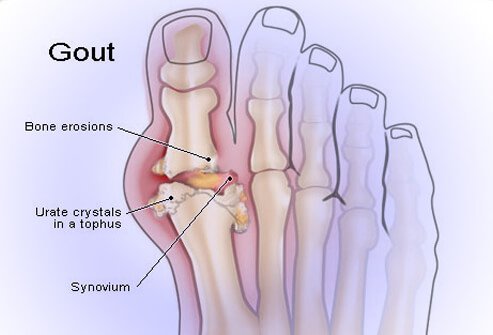
Metabolic Arthritis also known as Gout, is a form of acute arthritis that cause severe pain and swelling in the joints. It most commonly affects the big toe, but also affect the heel, ankle, hand, wrist or elbow. It affects the spine often enough to be a factor in back pain. Gout usually comes on suddenly, goes away after 5-10 days, and can keep recurring. Gout is different from other forms of arthritis because it occurs when there are high levels of uric acid circulating in the blood, which can cause urate crystals to settle in the tissues of the joints.
Gouty arthritis is a common cause of a sudden onset of a painful, hot, red, swollen joint , particularly in the foot at the big toe. Gouty arthritis is reportedly the most common cause of inflammatory arthritis in men over the age of 40. It is definitively diagnosed by detecting uric acid (monosodium urate) crystals in an aspirated sample of the joint fluid. These uric acid crystals can accumulate in the joint and tissues around the joint over years, intermittently triggering repeated bouts of acute inflammation. Repeated attacks of gouty arthritis, or "flares," can damage the joint and lead to chronic arthritis. Fortunately, while gout is a progressive disease, there are effective medications to treat gout.
Gout is more common in men than in women. It is also more common later in life with most patients having attacks after the age of 50. If your parents have gout then you are also at increased risk of getting gout yourself.